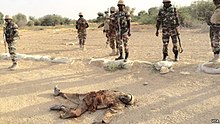The history of the Royal Air Force, the air force of the United Kingdom, spans a century of British military aviation.

Boko Haram, officially known as Jamā'at Ahl as-Sunnah lid-Da'wah wa'l-Jihād, is an Islamist terrorist organization based in northeastern Nigeria, which is also active in Chad, Niger, northern Cameroon, and Mali. Boko Haram was the world's deadliest terror group during part of the mid-2010s according to the Global Terrorism Index. In 2016, the group split, resulting in the emergence of a hostile faction known as the Islamic State's West Africa Province.
Chibok is a Local Government Area of Borno State, Nigeria, located in the southern part of the state. It has its headquarters in the town of Chibok.

The Boko Haram insurgency began in July 2009, when the militant Islamist and jihadist rebel group Boko Haram started an armed rebellion against the government of Nigeria. The conflict is taking place within the context of long-standing issues of religious violence between Nigeria's Muslim and Christian communities, and the insurgents' ultimate aim is to establish an Islamic state in the region.
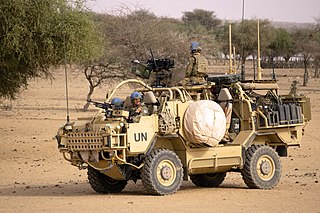
Operation Newcombe was the code name for two separate and concurrent British non-combat military operations in Mali. One operation involved logistical and airlift support for the French-led Operation Barkhane, whilst the other encompassed peacekeeping in support of the United Nations Multidimensional Integrated Stabilization Mission in Mali (MINUSMA). The operation was first launched on 13 January 2013 by Prime Minister David Cameron and initially involved strategic airlift and aerial reconnaissance. It later saw the deployment of a detachment of Chinook transport helicopters, before shifting its emphasis to UN peacekeeping in 2020. The operation ultimately drew to a close on 14 November 2022 due to political instability in the country.
Timeline of the Boko Haram insurgency is the chronology of the Boko Haram insurgency, an ongoing armed conflict between Nigerian Islamist group Boko Haram and the Nigerian government. Boko Haram have carried out many attacks against the military, police and civilians since 2009, mostly in Nigeria. The low-intensity conflict is centred on Borno State. It peaked in the mid 2010s, when Boko Haram extended their insurgency into Cameroon, Chad and Niger.

On the night of 14–15 April 2014, 276 mostly Christian female students aged from 16 to 18 were kidnapped by the Islamic terrorist group Boko Haram from the Government Girls Secondary School at the town of Chibok in Borno State, Nigeria. Prior to the raid, the school had been closed for four weeks due to deteriorating security conditions, but the girls were in attendance in order to take final exams in physics.

The Sambisa Forest is a forest in Borno State, northeast Nigeria. It is in the southwestern part of Chad Basin National Park, about 60km southeast of Maiduguri, the capital of Borno State. It has an area of 518 km².
On the night of 5-6 May 2014, Boko Haram militants attacked the twin towns of Gamboru and Ngala in Borno State, northeastern Nigeria. About 310 residents were killed in the 12-hour massacre, and the town was largely destroyed.
From 20 to 23 June 2014, a series of attacks occurred in Borno State, Nigeria. 91 women and children were kidnapped in the attacks and more than 70 people were killed.
The following lists events from 2014 in Nigeria.
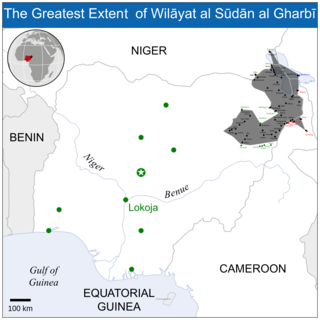
Starting in late January 2015, a coalition of West African troops launched an offensive against the Boko Haram insurgents in Nigeria.
On 8 March 2012, members of the British military Special Boat Service, supported by members of the Nigerian Army, attempted a rescue mission to rescue British hostage Chris McManus and Italian hostage Franco Lamolinara from Boko Haram, supported by Al Qaeda, in Sokoto in north-west Nigeria. The mission failed when both hostages were executed by their captors.
Amina Ali Nkeki is a Nigerian former hostage of Boko Haram. She was one of 276 female students the group kidnapped from Chibok in 2014. After 57 of the girls escaped in the first few months, the remaining 219 were held for several years. Of this larger group, Ali was the first freed. She was found on 17 May 2016 by Civilian Joint Task Force along with a four-month-old child and an alleged Boko Haram member, Mohammed Hayatu, who described himself as her husband. All three were severely malnourished.
On February 19, 2018, at 5:30 pm, 110 schoolgirls aged 11–19 years old were kidnapped by the Boko Haram terrorist group from the Government Girls' Science and Technical College (GGSTC). Dapchi is located in Bulabulin, Bursari Local Government area of Yobe State, in the northeast part of Nigeria. The federal government of Nigeria deployed the Nigerian Air Force and other security agencies to search for the missing schoolgirls and to hopefully enable their return. The governor of Yobe State, Ibrahim Gaidam, blamed Nigerian Army soldiers for having removed a military checkpoint from the town. Dapchi lies approximately 275 km northwest of Chibok, where over 276 schoolgirls were kidnapped by Boko Haram in 2014.
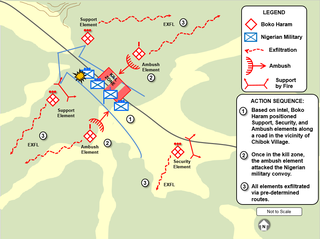
The Chibok ambush was an attack of Boko Haram insurgents against a Nigerian Army convoy in the night from 13 to 14 May 2014, as the latter was searching for schoolgirls who had been kidnapped by the Islamist rebels. Even though the Nigerian Army forces managed to extricate themselves from the ambush, the attack seriously affected the morale of the involved soldiers who felt that their leadership was carelessly sacrificing them in the war against the insurgents. As result, elements of the Nigerian Army's 7th Division subsequently mutinied at Maiduguri and almost killed their own commander, "humiliat[ing] the Nigerian military".
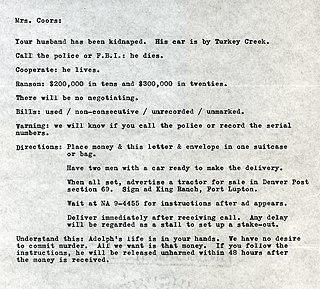
Kidnapping is a major problem in Nigeria in the early 21st century. Kidnapping by bandits and insurgents is among the biggest organised or gang crime in Nigeria and is a national security challenge.
During the evening of 11 December 2020, over 300 pupils were kidnapped from a boys' secondary boarding school on the outskirts of Kankara, Katsina State, northern Nigeria. A gang of gunmen on motorcycles attacked the Government Science Secondary School, where more than 800 pupils reside, for over an hour.
The Zamfara kidnapping was the abduction of 279 female students aged between 10 and 17 during a raid by armed bandits on 26 February 2021. The kidnapping occurred at the Government Girls Science Secondary School, a boarding school in Jangebe, in Zamfara State, Nigeria. All hostages were released by the bandits on 2 March 2021, though claims vary as to the negotiation methods used by the Nigerian government in order to facilitate their release.

The Nigerian Air Force Regiment is component of the Nigerian Air Force that serves as a specialist airfield and defense corps.
